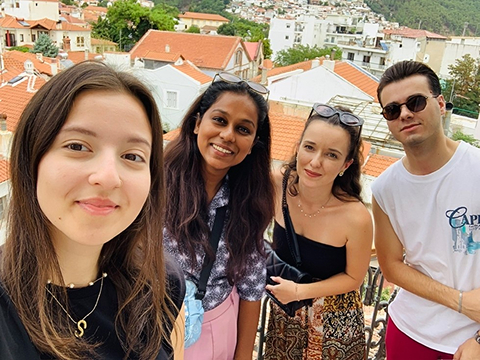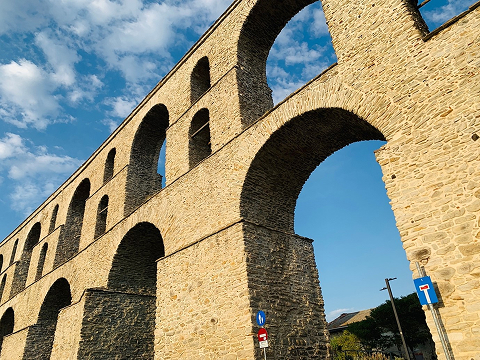The Interconnection between my Research Interests with the Third Kavala Summer School
Energy-related matters, the geostrategic objectives of the Euro-Atlantic Cooperation, particularly in the MENA region and the Eastern Mediterranean, and the Republic of Cyprus’s crucial position in international relations were the key topics of discussion during the Kavala summer school. The issues of Cyprus is fairly different from the focus of my research interests. However, because of their shared colonial pasts and geographic locations, the cases of Sri Lanka and Cyprus have more in common that I initially recognized when I attended the lectures. This in particular helped me comprehend how the history of colonialism and the current issues in the multicultural status are related. For example, Cyprus was occupied militarily by the British from 1914 to 1925 and from 1925 until 1960, it was a crown colony. The current state of affairs is largely due to the lack of attention paid during British colonial rule to the local population’s educational development, policy frameworks, access restrictions to English-language education, competition, and selection criteria for employment and education.
When examining the Sri Lankan case, which also exhibits a comparable pattern. From 1815 to 1948, the Democratic Socialist Republic of Sri Lanka was a crown colony of the British. The British used the “ruling with dividedness” strategy during the colonial era, which is now recognized as one of the main causes of the ethnic conflict and the ethno-religiously motivated divide lines that the state is still experiencing. As a result, during Kavala, I was inspired to define British colonial rule as a conclusive key root cause towards the current conflict during the period after colonialism. Particularly, I was inspired to examine the similar case studies to further build my argument. This is because the British policy of imbalanced education and employment opportunities towards the majority & minority population becomes crucial.
Conversely, I was able to discern that Cyprus’s geographic location becomes significant and is directly related to the state’s current predicament. For instance, the state is situated between important migration routes (such as the Greco-Turkish route and the Cyprus root) and the transcontinental crossroads. Yet, the state is situated close to several international wars, including those involving Syria, Lebanon, and Israel/Palestine. Nevertheless that is situated in a key area for energy hubs, such as production, transit, and oil and gas fields. When compared to Cyprus, the state of Sri Lanka is similarly situated in the Indian Ocean close to important maritime lanes, which led to the state being colonized by three western countries: the Portuguese, Dutch, and British. However, the establishment of the plantation system for tea and coffee, the dismantling of all state monopolies, and the repeal of the obligatory labor system were also associated with the socio-economic, cultural, and political upheavals that changed the course of the state’s actual transitions.
Memories and Networks towards an Academic Discussion
The chance I had to network and speak with the American College of Thessaliniki students and especially the Xanthi representatives and the other attendees became unforgettable. In particular, I had a great opportunity to learn about their perspectives and gain an awareness of not just the Cyprus issue but also the history and foreign policy of Greece. For me, the most memorable experience was visiting Xanthi City, which serves as the capital of the Xanthi regional unit of East Macedonia and Thrace. I had the good fortune to explore both the old and new towns while strolling around the western section of the city. I was taken aback by the elaborate architecture seen in the Greek churches, Ottoman-era mosques, and Neoclassical mansions that make up Xanthi’s ancient town.

A significant sign in between the old & modern Xanthi towns I witnessed
The fact that we were led around by summer school participants from the city of Xanthi made the tour extremely meaningful. I was shocked to discover that a church and a mosque were situated quite near to one another while on the sidewalk. In addition, we used to hear the mosque’s daily prayers. I asked a Greek Christian college from our group whether she enjoyed hearing that sound five times a day. She told me, grinning, that “I enjoy hearing the prayer sound and that is a part of my day”. I was taken aback because this situation was not at all like my experience in Sri Lanka. Because of objections (primarily at the political, administrative, religious, and communal levels), it is, for instance, impossible to build a church and a mosque in close proximity to each other. This is a widespread problem among all different religions within the Sri Lankan context. However, the majority of other religious groups were unable to adapt to the five times a day that Sri Lankan Muslims used to pray and broadcast their prayers. That is extremely comparable to both the Buddhist temple prayers (called Pirith ) and the case of mosque prayers.
As I continued to talk with my friends from Xanthi , I came to realize how important their educational system is to fostering awareness and an upbeat dispositions. According to what I’ve been told, every youngster in this multicultural community attends a common school where instruction is given in Greek. They can therefore interact with other kids with ease, and they don’t give thought about the racial or religious background of their friends. All that matters to them is whether or not that specific person is a good friend.

With the amazing collogues from Xanthi, I met in Kavala
This prompted me to do a more thorough examination of Sri Lanka’s current educational system, which is made up of lingually classified policies and instruction in various languages depending on the mother tongue of the relevant ethno-religious community. My experience in the Sri Lankan case led me to recognize that language barriers are a major obstacle to rapprochement between the various ethnic and religious groups. This visit to Xanthi also provided me with some insights about the alternatives to educational policies that are necessary as a means of addressing the deeper divisions in Sri Lankan society that stem from ethno-religious identities.

Adueduct of Kavala

